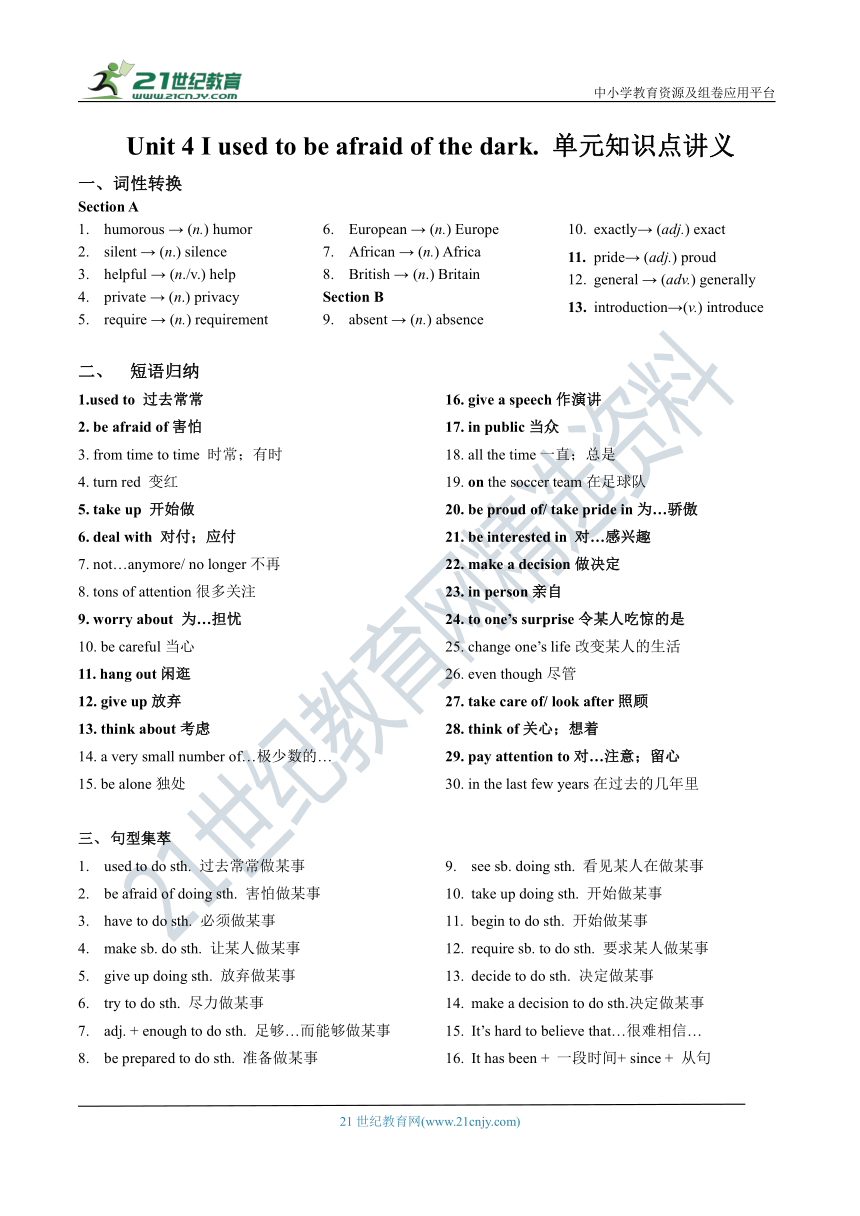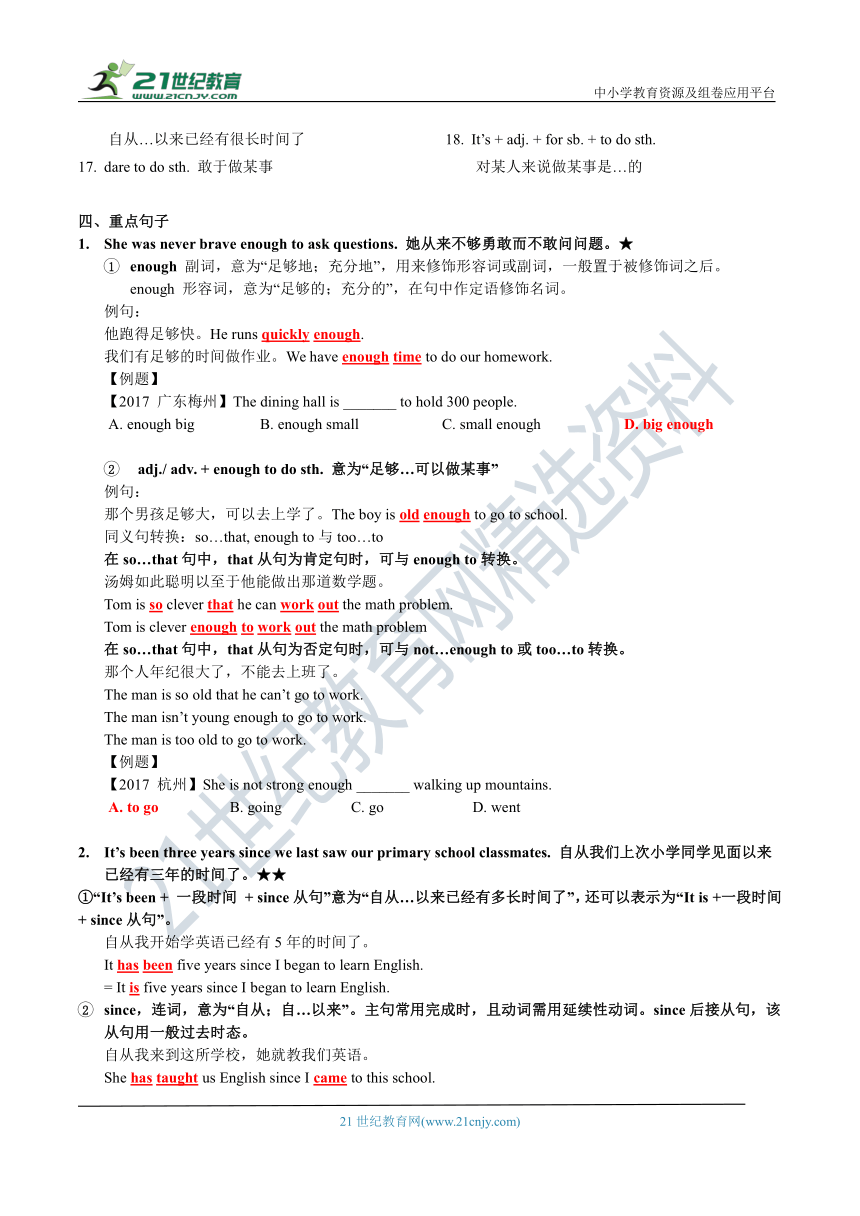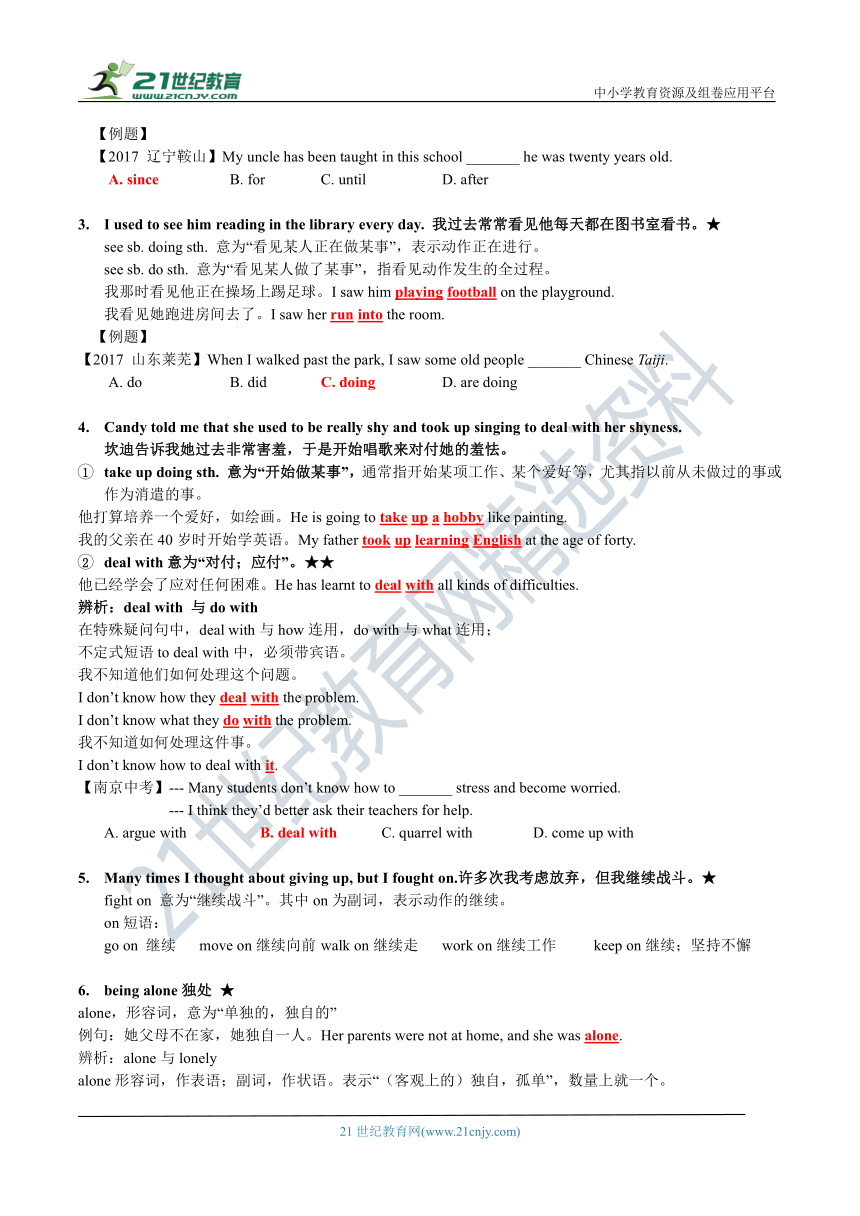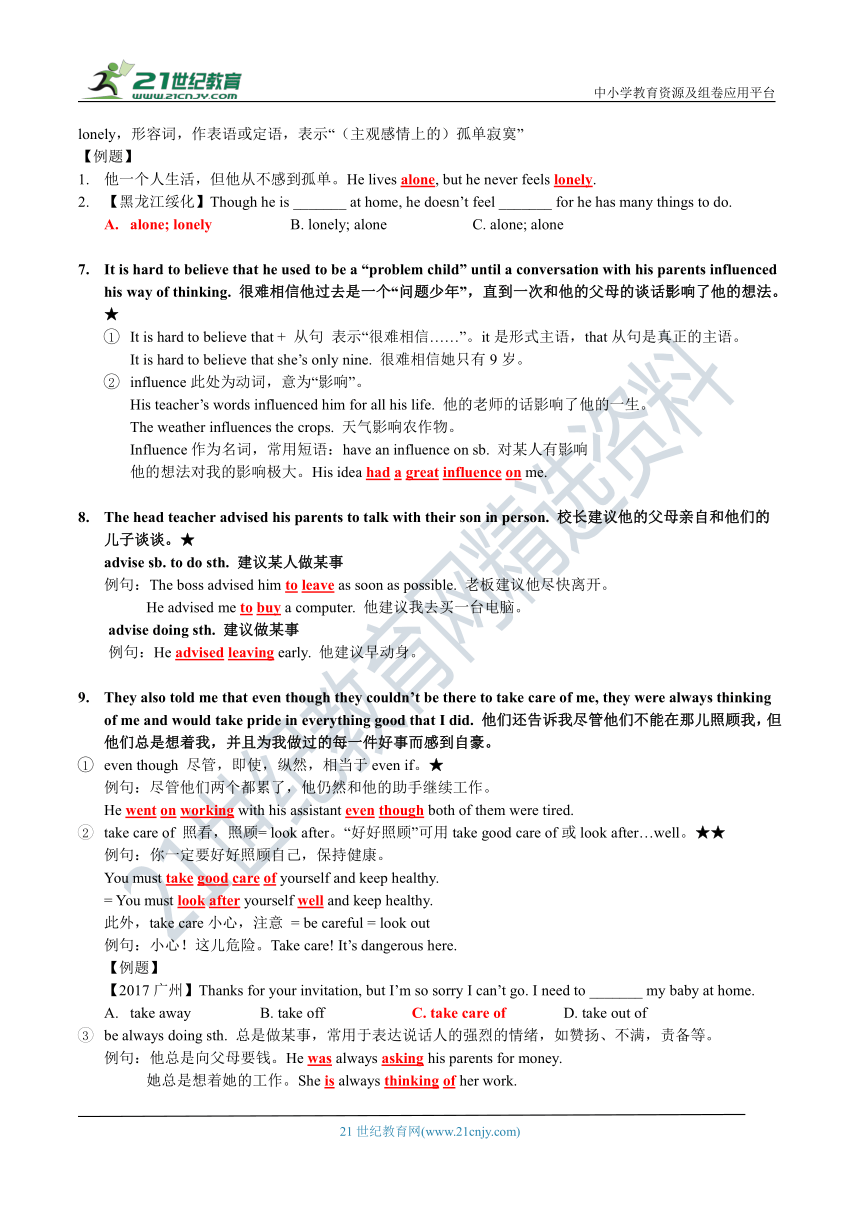Unit 4 I used to be afraid of the dark. 单元知识点讲义
文档属性
| 名称 | Unit 4 I used to be afraid of the dark. 单元知识点讲义 |  | |
| 格式 | zip | ||
| 文件大小 | 1.2MB | ||
| 资源类型 | 试卷 | ||
| 版本资源 | 人教新目标(Go for it)版 | ||
| 科目 | 英语 | ||
| 更新时间 | 2020-02-05 20:11:40 | ||
图片预览




文档简介
中小学教育资源及组卷应用平台
Unit 4 I used to be afraid of the dark. 单元知识点讲义
一、词性转换
Section A
humorous → (n.) humor
silent → (n.) silence
helpful → (n./v.) help
private → (n.) privacy
require → (n.) requirement
European → (n.) Europe
African → (n.) Africa
British → (n.) Britain
Section B
absent → (n.) absence
exactly→ (adj.) exact
pride→ (adj.) proud
general → (adv.) generally
introduction→(v.) introduce
短语归纳
1.used to 过去常常
2. be afraid of害怕
3. from time to time 时常;有时
4. turn red 变红
5. take up 开始做
6. deal with 对付;应付
7. not…anymore/ no longer不再
8. tons of attention很多关注
9. worry about 为…担忧
10. be careful当心
11. hang out闲逛
12. give up放弃
13. think about考虑
14. a very small number of…极少数的…
15. be alone独处
16. give a speech作演讲
17. in public当众
18. all the time一直;总是
19. on the soccer team在足球队
20. be proud of/ take pride in为…骄傲
21. be interested in 对…感兴趣
22. make a decision做决定
23. in person亲自
24. to one’s surprise令某人吃惊的是
25. change one’s life改变某人的生活
26. even though尽管
27. take care of/ look after照顾
28. think of关心;想着
29. pay attention to对…注意;留心
30. in the last few years在过去的几年里
句型集萃
used to do sth. 过去常常做某事
be afraid of doing sth. 害怕做某事
have to do sth. 必须做某事
make sb. do sth. 让某人做某事
give up doing sth. 放弃做某事
try to do sth. 尽力做某事
adj. + enough to do sth. 足够…而能够做某事
be prepared to do sth. 准备做某事
see sb. doing sth. 看见某人在做某事
take up doing sth. 开始做某事
begin to do sth. 开始做某事
require sb. to do sth. 要求某人做某事
decide to do sth. 决定做某事
make a decision to do sth.决定做某事
It’s hard to believe that…很难相信…
It has been + 一段时间+ since + 从句
自从…以来已经有很长时间了
dare to do sth. 敢于做某事
It’s + adj. + for sb. + to do sth.
对某人来说做某事是…的
四、重点句子
She was never brave enough to ask questions. 她从来不够勇敢而不敢问问题。★
enough 副词,意为“足够地;充分地”,用来修饰形容词或副词,一般置于被修饰词之后。
enough 形容词,意为“足够的;充分的”,在句中作定语修饰名词。
例句:
他跑得足够快。He runs quickly enough.
我们有足够的时间做作业。We have enough time to do our homework.
【例题】
【2017 广东梅州】The dining hall is _______ to hold 300 people.
A. enough big B. enough small C. small enough D. big enough
adj./ adv. + enough to do sth. 意为“足够…可以做某事”
例句:
那个男孩足够大,可以去上学了。The boy is old enough to go to school.
同义句转换:so…that, enough to与too…to
在so…that句中,that从句为肯定句时,可与enough to转换。
汤姆如此聪明以至于他能做出那道数学题。
Tom is so clever that he can work out the math problem.
Tom is clever enough to work out the math problem
在so…that句中,that从句为否定句时,可与not…enough to或too…to转换。
那个人年纪很大了,不能去上班了。
The man is so old that he can’t go to work.
The man isn’t young enough to go to work.
The man is too old to go to work.
【例题】
【2017 杭州】She is not strong enough _______ walking up mountains.
A. to go B. going C. go D. went
It’s been three years since we last saw our primary school classmates. 自从我们上次小学同学见面以来已经有三年的时间了。★★
①“It’s been + 一段时间 + since从句”意为“自从…以来已经有多长时间了”,还可以表示为“It is +一段时间+ since从句”。
自从我开始学英语已经有5年的时间了。
It has been five years since I began to learn English.
= It is five years since I began to learn English.
since,连词,意为“自从;自…以来”。主句常用完成时,且动词需用延续性动词。since后接从句,该从句用一般过去时态。
自从我来到这所学校,她就教我们英语。
She has taught us English since I came to this school.
【例题】
【2017 辽宁鞍山】My uncle has been taught in this school _______ he was twenty years old.
A. since B. for C. until D. after
I used to see him reading in the library every day. 我过去常常看见他每天都在图书室看书。★
see sb. doing sth. 意为“看见某人正在做某事”,表示动作正在进行。
see sb. do sth. 意为“看见某人做了某事”,指看见动作发生的全过程。
我那时看见他正在操场上踢足球。I saw him playing football on the playground.
我看见她跑进房间去了。I saw her run into the room.
【例题】
【2017 山东莱芜】When I walked past the park, I saw some old people _______ Chinese Taiji.
A. do B. did C. doing D. are doing
Candy told me that she used to be really shy and took up singing to deal with her shyness.
坎迪告诉我她过去非常害羞,于是开始唱歌来对付她的羞怯。
take up doing sth. 意为“开始做某事”,通常指开始某项工作、某个爱好等,尤其指以前从未做过的事或作为消遣的事。
他打算培养一个爱好,如绘画。He is going to take up a hobby like painting.
我的父亲在40岁时开始学英语。My father took up learning English at the age of forty.
deal with意为“对付;应付”。★★
他已经学会了应对任何困难。He has learnt to deal with all kinds of difficulties.
辨析:deal with 与do with
在特殊疑问句中,deal with与how连用,do with与what连用;
不定式短语to deal with中,必须带宾语。
我不知道他们如何处理这个问题。
I don’t know how they deal with the problem.
I don’t know what they do with the problem.
我不知道如何处理这件事。
I don’t know how to deal with it.
【南京中考】--- Many students don’t know how to _______ stress and become worried.
--- I think they’d better ask their teachers for help.
A. argue with B. deal with C. quarrel with D. come up with
Many times I thought about giving up, but I fought on.许多次我考虑放弃,但我继续战斗。★
fight on 意为“继续战斗”。其中on为副词,表示动作的继续。
on短语:
go on 继续 move on继续向前 walk on继续走 work on继续工作 keep on继续;坚持不懈
being alone独处 ★
alone,形容词,意为“单独的,独自的”
例句:她父母不在家,她独自一人。Her parents were not at home, and she was alone.
辨析:alone与lonely
alone形容词,作表语;副词,作状语。表示“(客观上的)独自,孤单”,数量上就一个。
lonely,形容词,作表语或定语,表示“(主观感情上的)孤单寂寞”
【例题】
他一个人生活,但他从不感到孤单。He lives alone, but he never feels lonely.
【黑龙江绥化】Though he is _______ at home, he doesn’t feel _______ for he has many things to do.
alone; lonely B. lonely; alone C. alone; alone
It is hard to believe that he used to be a “problem child” until a conversation with his parents influenced his way of thinking. 很难相信他过去是一个“问题少年”,直到一次和他的父母的谈话影响了他的想法。★
It is hard to believe that + 从句 表示“很难相信……”。it是形式主语,that从句是真正的主语。
It is hard to believe that she’s only nine. 很难相信她只有9岁。
influence此处为动词,意为“影响”。
His teacher’s words influenced him for all his life. 他的老师的话影响了他的一生。
The weather influences the crops. 天气影响农作物。
Influence作为名词,常用短语:have an influence on sb. 对某人有影响
他的想法对我的影响极大。His idea had a great influence on me.
The head teacher advised his parents to talk with their son in person. 校长建议他的父母亲自和他们的儿子谈谈。★
advise sb. to do sth. 建议某人做某事
例句:The boss advised him to leave as soon as possible. 老板建议他尽快离开。
He advised me to buy a computer. 他建议我去买一台电脑。
advise doing sth. 建议做某事
例句:He advised leaving early. 他建议早动身。
They also told me that even though they couldn’t be there to take care of me, they were always thinking of me and would take pride in everything good that I did. 他们还告诉我尽管他们不能在那儿照顾我,但他们总是想着我,并且为我做过的每一件好事而感到自豪。
even though 尽管,即使,纵然,相当于even if。★
例句:尽管他们两个都累了,他仍然和他的助手继续工作。
He went on working with his assistant even though both of them were tired.
take care of 照看,照顾= look after。“好好照顾”可用take good care of或look after…well。★★
例句:你一定要好好照顾自己,保持健康。
You must take good care of yourself and keep healthy.
= You must look after yourself well and keep healthy.
此外,take care小心,注意 = be careful = look out
例句:小心!这儿危险。Take care! It’s dangerous here.
【例题】
【2017广州】Thanks for your invitation, but I’m so sorry I can’t go. I need to _______ my baby at home.
take away B. take off C. take care of D. take out of
be always doing sth. 总是做某事,常用于表达说话人的强烈的情绪,如赞扬、不满,责备等。
例句:他总是向父母要钱。He was always asking his parents for money.
她总是想着她的工作。She is always thinking of her work.
take pride in = be proud of为…感到自豪
例句:这个年轻的妈妈为她的儿子感到自豪。
The young mother took pride in her son. = The young mother was proud of her son.
【例题】
【山东烟台】根据汉语,将下列意思补充完整。(每空一词)
他父亲对他做的事情感到自豪。
His father takes great pride in what he has done.
My life has changed a lot in the last few years. 在过去的几年里,我的生活改变了许多。★★
in the last few years = in the past few years = over/ during the last/ past few years 在过去的几年里,现在完成时的时间状语标志。
例句:
在过去的几年里我学到了很多。I have learnt a lot in the last few years.
在过去的几年里这个村庄发生了巨大的变化。
Great changes have taken place in the village in the last few years.
五、语法归纳: used to
结构:used to + 动词原形
用法:表示过去的习惯动作或状态,现在已不再发生或不存在。
句型变化:
否定句:used not to, usedn’t to或didn’t use to
一般疑问句:Did sb. use to…?或Used sb. to…?
反意疑问句:附加疑问部分可用didn’t或usedn’t
相似短语:
be/ get/ become used to doing sth. 习惯做某事
be used to do sth. 被用于做某事
【例题】
她以前不留长发。She didn’t use to have long hair. = She usedn’t to have long hair.
你过去经常弹钢琴吗?Did you use to play the piano? = Used you to play the piano?
他过去常常喝酒,对吗?He used to drink, usedn’t he?
他过去不经常喝酒,对吗?He didn’t use to drink, did he?
我爷爷习惯于晚饭后去散步。My grandfather is used to going for a walk after supper.
木头能用来造纸。Wood can be used to make paper.
【语法专练】
【湖北黄冈】--- How is your grandma?
--- She’s fine. She used to _______ TV at home after supper. But now she is used to _______ out for a walk.
Watch; go B. watching; go
C. watching; going D. watch; going
【黑龙江龙东】She _______ live with her grandparents, but she doesn’t now.
used to B. is used to
C. was used to
【北京顺义木林中学第二次月考】---Rooney used to _______ late for school.
--- Yes, but now she is used to _______ up early.
be; get B. being; getting
C. being; get D. be; getting
【安徽桐城黄冈初中月考】He used to_______ in the morning, but now he is used to _______ at night.
reading; read B. read; read
C. reading; reading D. read; reading
5. She used to be quiet, _______ she?
A. used B. didn’t C. did D. doesn’t
6. He used to _______ to school late, but now he doesn’t.
A. go B. going C. went D. goes
7. He _______ practicing speaking English in the morning.
A. used to B. is used to C. uses to D. is using to
8. Lucy used to go to bed late, _______ she?
A. didn’t B. doesn’t C. hadn’t D. isn’t
9. --- _______ new buildings! I can’t believe it. It _______ a poor village.
--- Yes. Everything has changed here these years.
A. So many; used to be B. So much; is used to being
C. Too many; used to D. Too much; used to
10. Her son _______ Coke, but now he _______ milk.
A. used to drink; is used to drinking B. used to drinking; drinks
C. is used to drinking; used to drink D. is used to drink; is drinking
11. 【2017黑龙江绥化】--- My aunt goes to climb mountains every Sunday.
--- Oh? But she _______ hate climbing mountains.
A. used to B. was used to C. is used to
反意疑问句
特点:前否后肯,前肯后否。附加问句中的动词在时态、人称和数等方面必须与前半句的动词相呼应。
用法:反意问句要点三,前后谓语正相反;附加问句not现,必须缩写是习惯;最后一点应注意,问句主语代词替。
例句:
你是个学生,对吗?You are a student, aren’t you?
我们不能把书拿出去,对吗?We can’t take books out, can we?
回答:如果答语是肯定的,用“Yes + 肯定结构”;如果答语是否定的,则用“No + 否定结构”。
例句:
--- He enjoys singing, doesn’t he? 他喜欢唱歌,是吗?
--- Yes, he does./ No, he doesn’t. 是的,他喜欢。/ 不,他不喜欢。
--- You didn’t go to school, did you? 你没有去上学,是吗?
--- Yes, I did./ No, I didn’t. 不,我去了。/ 是的,我没有去。
【例题】
【2017湖南益阳】--- Jim had nothing for breakfast this morning, _______?
--- _______ . He got up too late.
had he; Yes B. hadn’t he; Yes C. did he; No
HYPERLINK "http://21世纪教育网(www.21cnjy.com)
" 21世纪教育网(www.21cnjy.com)
同课章节目录
- Unit 1 How can we become good learners.
- Section A
- Section B
- Unit 2 I think that mooncakes are delicious!
- Section A
- Section B
- Unit 3 Could you please tell me where the restroom
- Section A
- Section B
- Unit 4 I used to be afraid of the dark.
- Section A
- Section B
- Unit 5 What are the shirts made of?
- Section A
- Section B
- Review of Units 1-5
- Unit 6 When was it invented?
- Section A
- Section B
- Unit 7 Teenagers should be allowed to choose their
- Section A
- Section B
- Unit 8 It must belong to Carla.
- Section A
- Section B
- Unit 9 I like music that I can dance to.
- Section A
- Section B
- Unit 10 You're supposed to shake hands.
- Section A
- Section B
- Review of Units 6-10
- Unit 11 Sad movies make me cry.
- Section A
- Section B
- Unit 12 Life is full of the unexpected
- Section A
- Section B
- Unit 13 We're trying to save the earth!
- Section A
- Section B
- Unit 14 I remember meeting all of you in Grade 7.
- Section A
- Section B
- Review of Units 11-14
